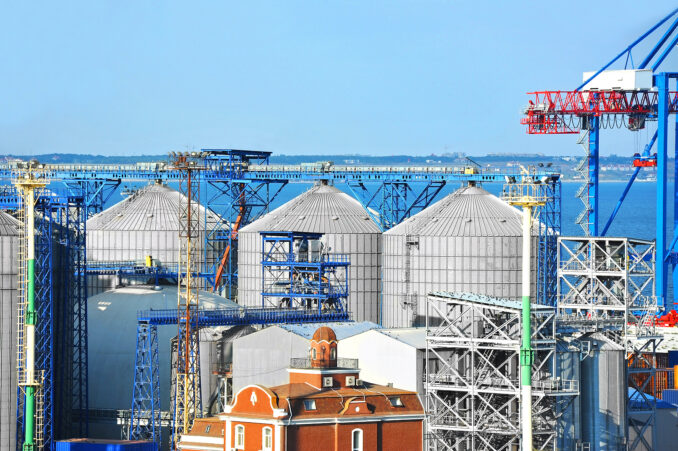

Grain silo in the port of Odessa, Ukraine
July 24 — A deal brokered by Turkey for the export of grain from both Ukraine and Russia presents a political problem for U.S. imperialism and its war aims. Washington’s response: ship more weapons.
The landmark deal to move hundreds of tons of grain, if it moves forward, undermines U.S./NATO determination to continue the war in Ukraine despite the cost to that country and the dire threat of famine in countries around the world.


Grain silo in the port of Odessa, Ukraine
Washington is especially frustrated that the deal was arranged by NATO-member Turkey’s President Recep Tayyip Erdogan and that U.N. Secretary General António Guterres participated. Erdogan has refused to go along with the thousands of sanctions imposed on Russia.
Washington strategists aim to direct this proxy war in Ukraine and extend it, if possible. Billions of dollars in military contracts and war profits are at stake.
Yet, the grand plan of a global front that would make Russia collapse is going awry.
In another development, photos of Russian President Vladimir V. Putin, Iranian President Ebrahim Raisi and Turkey’s President Erdogan showed them meeting in Tehran July 19, providing a warning of U.S. imperialism’s losing political control. The meeting of Washington’s two main targets challenges the claim that Iran and Russia are isolated and facing collapse. Russian gas giant Gazprom has signed a $40 billion agreement with the National Iranian Oil Company to help Iranian producers develop oil and gas fields throughout their country.
A week earlier, President Joe Biden’s trip to Israel and Saudi Arabia ended in a total failure. Biden failed to shape a coalition against Iran. He failed to convince Saudi Arabia to increase oil production or to accept the U.S.-proposed oil cap on the price of Russian oil.
U.S. response – more weapons
The immediate U.S. response to the grain deal involving both Ukraine and Russia and the meeting in Tehran was to announce a $270 million in military aid to Ukraine. The U.S. administration vowed to supply Ukraine with more high mobility artillery rocket systems (HIMARS) along with 580 Phoenix Ghost tactical drones. The U.S. and Ukraine portray the HIMARS rocket launchers as “a potential game changer” in the conflict.
White House national security council spokesman John Kirby announced the new arms transfer by again predicting a long war: “The president has been clear that we’re going to continue to support the government of Ukraine and its people for as long as it takes.” (AP, July 22)
Over the last five months, the U.S. and its European allies have supplied billions of dollars in weapons to Ukraine and imposed unprecedented sanctions on Moscow. It is well understood that the continuing influx of weapons, military contractors and coercive economic measures will prolong the war.
The food deal
The complex deal to move hundreds of tons of both Ukrainian and Russian grain and fertilizer through narrow, de-mined channels in the Black Sea, then through the Bosporus into the Mediterranean Sea and world markets involved separate agreements with Ukraine and Russia.
Ukraine’s military had mined the Port of Odessa and refused to remove the mines, citing military priorities. At the same time Ukraine’s government blamed Russia for blocking the mined harbor.
The 120-day limited agreement — which is no ceasefire — creates a demilitarized corridor through the Black Sea for agricultural exports. Battles continue even in the immediate area of Odessa. But the agreement provides a gap in the sanctions that have blocked Russian grain from world markets.
The deal also allows unimpeded access of Russian fertilizers to global markets. Russia is a major producer of fertilizers, which are vital to maximizing food production.
The ships will be monitored by a U.N.-led joint coordination center, which will be established immediately in Istanbul and include representatives from Ukraine, Russia and Turkey. (tinyurl.com/2s3s5zhp)
According to U.S. Secretary of State Antony Blinken, 85 ships at Odessa’s seaport were full of grain, with 20 million to 25 million tons of grain nearby in silos. The Port of Odessa is one of the largest ports in the Black Sea basin.
The city of Odessa is a large industrial center, with well-equipped docks and ship-repair yards, a wide range of engineering industries, chemical industries, oil refining and food processing.
This agreement to move food to prevent famine faces an uphill battle. Ukraine is awash in U.S. military contractors, trainers and mercenary forces.
The city of Odessa is controlled by fascist forces. On May 2, 2014, paramilitary forces with Nazi and Ukrainian fascist Bandera symbols massacred anti-fascist protesters who sought refuge at the House of Labor. Their control of the city and the surrounding region continues.
More than 7,000 sanctions
For over five months, the harsh sanctions imposed by the U.S. and the European Union — at U.S. demand — have blocked Russia from exporting grain, fertilizer, oil and gas to the world market. This has created an economic crisis far beyond Russia.
Between Feb. 22 and July 20, Australia, Canada, the European Union (EU), Japan, Switzerland, Britain and the U.S. imposed a total of 7,271 sanctions on Russia, including 1,350 entities. The measures included asset freezes and travel bans. (statista.com, July 22)
Sanctions blocked Russia’s Central Bank from accessing more than $400 billion in foreign-exchange reserves held abroad. The G7 countries decided to disconnect several Russian banks from the SWIFT system. This imposition of the most severe sanctions in modern history was intended to create an economic catastrophe, hyperinflation, uprisings and the collapse of the Russian state.
Russia is one of the largest raw materials suppliers to the world market. Russia has the largest land mass in the world and is grain, protein, fertilizer and energy self-sufficient. The sanctions meant to destabilize and dismember Russia have boomeranged back on the countries that imposed the harsh measures. And the sanctions imposed on Russia have especially impacted Africa, creating spiraling economic dislocation throughout African countries.
Although the U.S. demanded the sanctions on all Russian exports and transactions, including grains, fertilizers and energy, U.S. corporate media and U.S. and NATO politicians have blamed Russia for withholding supplies that the imperialist countries have themselves blocked.
Countries around the world, including most of the countries of the continents of Asia and South America and all those of Africa, have, however, refused to accept or acknowledge the U.S./EU sanctions.
The head of the African Union, Macky Sall, linked U.S. sanctions to the continent’s food shortages. “Anti-Russia sanctions have made this situation worse, and now we do not have access to grain from Russia, primarily to wheat.” Sall continued, “And, most importantly, we do not have access to fertilizer. The situation was bad, and now it has become worse, creating a threat to food security in Africa.” (bloomberg.com, July 3)
What is completely scrubbed from the U.S. media is any mention of the U.S. sanctions that were already imposed for years on 17 African countries. These have had a destabilizing impact on the whole region.
The ruling class with their military and policy planners well understand the impact of their decisions. But to preserve the rulers’ fabulous wealth and dominant position, “the administration is willing to countenance even a global recession and mounting hunger.” (Washington Post, June 17)
Hamas issued the following statement on April 24, 2025, published on Resistance News Network. The…
By D. Musa Springer This statement is from Hood Communist editor and organizer D. Musa…
Portland, Oregon On April 12 — following protests in Seattle and elsewhere in support of…
This statement was recently issued by over 30 groups. On Friday, March 28, Dr. Helyeh…
When Donald Trump announced massive tariffs on foreign imports April 2, Wall Street investors saw…
The century-long struggle to abolish the death penalty in the U.S. has been making significant…